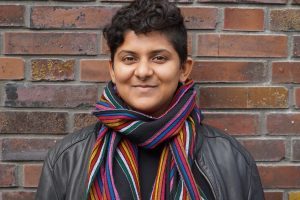Fair and Faithful Language Processing

Computer scientist Vagrant Gautam joined HITS as an Independent Postdoc in September 2025. The program offers young researchers the opportunity to shape the crucial step from completing their doctorate to leading their own research group with a high degree of independence.
Born in Canada, Vagrant was raised in India and Singapore and returned to Canada to study computational linguistics at Simon Fraser University. Vagrant earned a PhD at the Faculty of Mathematics and Computer Science at Saarland University, Germany, with a dissertation on “Fair and Faithful Processing of Referring Expressions in English.” At HITS, Vagrant will collaborate closely with the Natural Language Processing (NLP) group.
Vagrant’s research focuses on both technical and social aspects of language technology: from developing linguistically informed methods for reference resolution and pronoun use, to critically examining concepts such as fairness, bias, and democratization in NLP and machine learning.
The HITS Independent Postdoc Program offers a two- to three-year position with access to IT resources, further training, and integration into an interdisciplinary research community. The first participant in the program was astrophysicist Rajika Kuruwita, who will leave HITS in September 2025 after three years. Another participant is computational chemist Fabian Grünewald, who has been working at HITS since October 2024. With Vagrant, we are pleased to welcome the program’s third fellow.
About HITS
HITS, the Heidelberg Institute for Theoretical Studies, was established in 2010 by physicist and SAP co-founder Klaus Tschira (1940-2015) and the Klaus Tschira Foundation as a private, non-profit research institute. HITS conducts basic research in the natural, mathematical, and computer sciences. Major research directions include complex simulations across scales, making sense of data, and enabling science via computational research. Application areas range from molecular biology to astrophysics. An essential characteristic of the Institute is interdisciplinarity, implemented in numerous cross-group and cross-disciplinary projects. The base funding of HITS is provided by the Klaus Tschira Foundation.